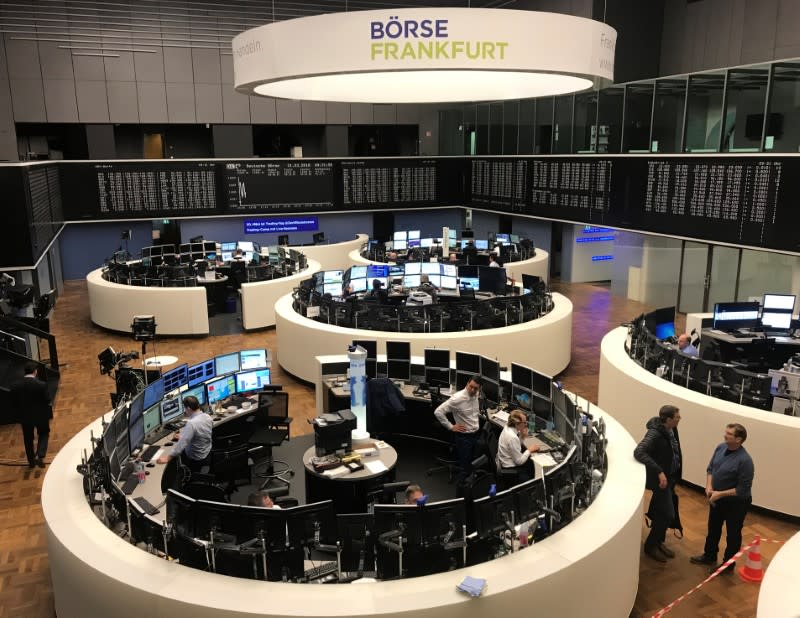Dollar eases, stocks climb amid benign U.S. inflation

By Herbert Lash
NEW YORK (Reuters) - The U.S. dollar eased on Friday while an index of global stock performance gained and was poised for its best week since early March, as moderate inflation eased worries about a faster pace of U.S. interest rate hikes and boosted risk appetite.
The dollar fell for a third day against a basket of major currencies as traders booked recent gains, which were tied to widening interest rate gaps in favor of the United States and signs of slower growth elsewhere in the world.
Gold posted its first weekly gain in four weeks after soft U.S. inflation data on Thursday suggested the Federal Reserve would show caution as it tightens monetary policy by raising rates.
Oil prices slipped but remained near 3-1/2 year highs as the prospect of new U.S. sanctions against Iran might reduce Middle East supply at a time when global crude production is just keeping pace with rising demand.
U.S. stocks gained as healthcare shares rallied even after President Donald Trump blasted drugmakers and healthcare "middlemen" for making prescription drugs unaffordable for Americans. Trump also said the pharmaceutical industry makes an "absolute fortune" at the expense of taxpayers.
The S&P healthcare index rose 1.47 percent as it became clear the Trump administration had avoided taking aggressive and direct measures to cut drug prices.
The market is responding to exceptionally strong earnings growth and benign inflation, said Leo Grohowski, chief investment officer at BNY Mellon Wealth Management in New York.
The Cboe Volatility Index, a barometer of expected near-term volatility for the S&P 500 that often is referred to as Wall Street's fear gauge, has fallen to levels last seen before the February market correction, he said.
"Not only has the market returned handsomely, but risk has also taken a breather," Grohowski said.
MSCI's gauge of stock markets across the globe rose 0.42 percent to advance 2.1 percent for the week, its best weekly gain since early March.
European shares edged higher. The pan-regional STOXX 600 index of companies in 17 countries closed up 0.11 percent for a seventh straight week of gains, the longest string of weekly advances since March 2015.
Shares in Daily Mail and General Trust (DMGT) rose 1.3 percent, having jumped as much as 9.4 percent, after U.S. private equity firm Silver Lake Management Co agreed to buy ZPG, the owner of British property websites Zoopla and PrimeLocation, for $3 billion.
On Wall Street, the Dow Jones Industrial Average rose 91.64 points, or 0.37 percent, to 24,831.17. The S&P 500 gained 4.65 points, or 0.17 percent, to 2,727.72 and the Nasdaq Composite dropped 2.09 points, or 0.03 percent, to 7,402.88.
For the week, the S&P 500 rose 2.4 percent, the Dow gained 2.3 percent and Nasdaq added 2.7 percent.
U.S. plans to reintroduce sanctions against Iran, which pumps about 4 percent of the world's oil, have buoyed crude prices.
U.S. crude fell 66 cents to settle at $70.70 per barrel and Brent settled down 45 cents at $77.12.
The dollar index fell 0.11 percent, with the euro up 0.23 percent to $1.194. The Japanese yen firmed 0.06 percent versus the greenback at 109.32 per dollar.
Central bankers around the world have turned more cautious as inflation and world trade concerns cloud the global economy.
On Thursday, the Bank of England held rates steady and New Zealand's Reserve Bank said the official cash rate will remain at 1.75 percent for "some time."
That leaves the Fed as the only major central bank committed to rate increases, but Thursday's moderate inflation reading cast doubt over the pace of any hikes.
Benchmark 10-year U.S. Treasury notes were little changed in price to yield 2.9695 percent.
U.S. gold futures for June delivery settled down $1.60 at $1,320.70 per ounce.
(Reporting by Herbert Lash; Editing by Chizu Nomiyama and Dan Grebler)

 Yahoo Finance
Yahoo Finance 